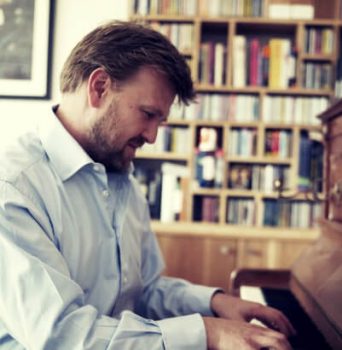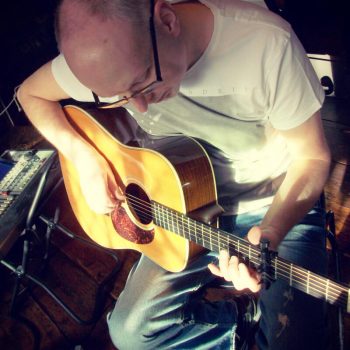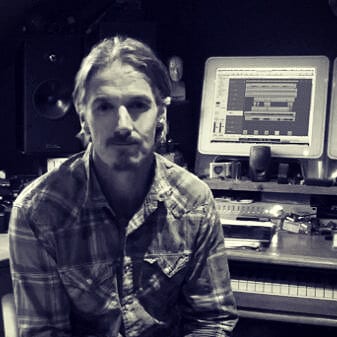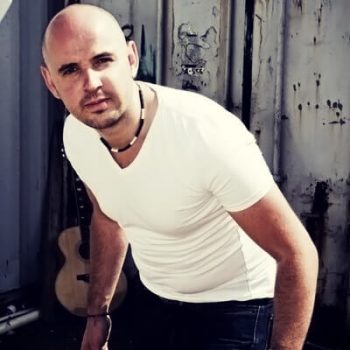Songwriting isn’t always roses and rainbows. The task can be quite neck breaking especially at times when your creative juice isn’t flowing. It’s during these times when it takes you hours upon hours just to write a single lines worth of lyrics, for a song you’ve been wanting to compose.

I know it’s frustrating, but whatever you do… don’t give up!
What your going through is an all too common experience that other songwriters have to wrestle with. And what separates the best from the rest are those that truly perseveres and stay committed to what they love doing the most – songwriting.
Allow me to share with you these timeless songwriting tips from top notch musicians. It is my hope that at the end of reading this post, you’d have learned tips and techniques about songwriting that can help you grow your skill as an artist.
Matthew Strachan, Composer and Singer-Songwriter
Know what you want to make before you make it
Builders don’t build a house without knowing its style, shape, size, and number of rooms. Have a snapshot of what you want to create.
Limit your options
If you’re making a living from writing you need to write lots. So you don’t have time to consider every option. Limit them; lack of choice breeds creativity.
Don’t let your critical voice silence your creative voice
There’s plenty of time to get it right later. Put on the page what you want to say how you want to say it. Then refine it.
Zoom in and out
You want the rhyming to be elegant and the scanning to be smooth. But keep an eye on the bigger picture. Focus on the detail and zoom back out to make sure the main point of the song hasn’t been lost.
Your girlfriend always cries at your latest song
So does your mother. But the real reckoning comes from people who don’t know you.
Listen to it in front of a pro
You’ll feel it when it when it gets slack. Take note of your own reaction.
Ignore writer’s block
It doesn’t exist. Practice your craft anyway. Write a haiku, a piece of blank verse, a limerick. Write an instrumental piece using a particular scale or mode. Keep going.
Like your song
But don’t fall in love with it. It will change. It will change when somebody hears it for the first time, sings it for the first time, when you hear it back after a couple of weeks. Don’t be precious.
Samuel Clarke, Composer and Musician
Network, Network, Network
This is probably the one of the most important out of the five. Meeting the right people is crucial for the career of a composer, musician or anyone in the creative industries. You can have the perfect song or be the best guitarist, but if no one can hear you, then how can you progress.
Keep Writing
Try and write as much as possible. Even if it’s just a little bit every day, it will help you not only to develop as a songwriter/composer, but it will help you come up with more ideas quickly. Perfect for if you are commissioned to write something at 11th hour.
Keep Motivated
It can be hard to keep motivated, especially if you are working a part-time job, or studying in your spare time, but you have to keep battling through it. Find time to relax and enjoy life as this well help with new ideas.
Don’t Give Up
It can be hard to accept rejection, but it is just a natural process. It doesn’t necessarily mean you are bad at what you do. Nine times out of ten it isn’t your ability it’s just not what they are looking for. Tip: Research the company or supervisor before you cold call / email them, as this can really help your chances of success.
Be Yourself
The last piece of advice is to just be yourself. When in meetings or emailing potential clients don’t say are a master of everything if you can only write indie rock. This will only jeopardise your chances.
John Maycraft, Composer and Songwriter
Never wait for inspiration to start writing music
You’ll starve to death before you compose your first tune! The creative process starts when you wake in the morning and doesn’t stop until sleep in the evening. Throughout the waking day creativity should be as natural as eating and drinking. This is where creativity is: seeing and hearing things in everyday situations: kids and partner in the house, talking and spending time with people, getting other’s ideas and opinions, going for a walk… To say it simply… Inspiration is life in general.
Take it all in
These influences are your ingredients in the musical cake you are about to bake!
When you pick up or sit at your chosen instrument the creative process is 70% complete (ingredients?), the last 30% or so is drawing the threads together (the baking process?) Creativity at this point isn’t waiting for inspiration, it is using what you felt was important in the day. From this point on, you work in conjunction with your instrument, and the final composition is where your mood and fingers take you.
Tim Howarth, Songwriter and Producer
I’ve been writing and producing songs for a good number of years, on my own and with co writers. Many have been published and many are still on my hard drive waiting for that inspired tweak to make it more marketable or just better! I’m still learning this craft, but here are a few tips that I’ve picked up along the way.
Start with a title
Starting with a title is often a good way to break that feeling of what is this song going to be about! Like the headline of a news article, try and make that prominent in the chorus and embellish the theme of that title in the verses.
Write from an emotional standpoint
I find conveying emotion is one of the hardest things to express in a lyric in a convincing and original way, but one of the best pieces of advice I’ve gleaned is to write FROM an emotional standpoint, not ABOUT the emotional standpoint. It’s not that obvious.
Don’t assuming the listener will understand
Just because you know the backstory to your lyric don’t fall into the trap of assuming the listener will understand it. Sometimes we feel it all makes sense to us the writer, but read it to a friend or someone who has no experience of your story and it often falls short of making any sense.
Have the melody
A lyric can often dictate the meter of the melody, so coming to a lyric with the melody already written can be a way of guiding the lyric with the sound and style of your song. I often sing nonsense/extemporaneous words into the mic just to write the melody, but often that nonsense ends up guiding the lyric with word sounds and rhythm.
Elliot James Frisby, Songwriter and music producer
Be honest with yourself
‘Everybody has their own way of writing so it’s important that you spend time finding it. Write as many songs as you can, ask for opinions outside your friend circle and take most of it on board. I can suggest many tips but they all boil down to TWO KEY TIPS… Be honest with yourself and edit!
Edit, Edit, Edit = Being proud
You will always know when a song is special and when it isn’t. The reason why you and everyone else knows this, is because when a good song reaches out to us, we buy it and it lasts a very long time! I assure you that apart from the rare occasion, a lot of editing and work has gone into creating what sometimes feels like a very simple song. With this in mind, when playing back your latest work, if there is a line or section that does not speak to you, then realize that it will not speak to your listener either and change it. If it’s still not right, then change it again. Edit, Edit, Edit = being proud of your song no matter how well it does!’
Ashes and Dreams, Recording Artists
Always collecting new ideas
I am always collecting new ideas for music and lyrics at the most inopportune time, like in the middle of the night, or when I’m traveling in my car. That’s why I always carry a hand-held recorder with me so I can dictate ideas into it. Most of my song ideas come from those sporadic, organic moments, rather than sitting down and trying to write something on the spot. I always have a catalog of song ideas ready to go in my hand-held recorder, so when I need ideas, they’re there – ready to be explored.
Having a songwriting partner
I also find having a songwriting partner like Liv has helped me grow exponentially as a songwriter. Having someone to collaborate with, bounce ideas off of, and develop with, makes a huge difference. In my musical career, I’ve learned more working with other musicians and songwriters than I ever did studying music theory. I also find our local library to be an incredible source of inspiration, as they carry a huge section of songwriting books and other materials.
Don’t strive to be original, just try to be yourself
If you find you are stuck for ideas, take a break, go for a walk on the beach or in the park (definitely not the mall, though). Sometimes it is a good strategy to take a break from music altogether for a few days or a week – then come back to it. For instance, if you play the guitar, come back to your instrument and use two strings only. See what you can come up with only using those two strings. It also helps to mix up your influences. If you’re into heavy rock, listen to a Classical radio station for a few days. If you are into Drum and Bass, listen to some Gregorian Chant Benedictinos. Also, sometimes being a songwriter involves a good amount of depression and loneliness. However, if you are a perfectly healthy person and social animal – mix up your routine. Don’t eat for a full day (but drink 4 cups of green tea). The next morning, hit the piano. Don’t take songwriting too seriously. You’re lucky if you have a supporting family and friends. Start early. That way by the time you’re 58, you are going to be like Diane Warren!
Photo credit: Rob Wozny
John Oates, Songwriter
Sing!
You do not have to have a great sounding voice but singing hundreds, if not thousands, of songs will help to internalize the songwriting process. Join a singing group, sing a variety of styles from religious to pop for example – each song will help you to learn about structure, harmony, melody and lyrics without you having to think about it.
Guitar or keyboard?
Learn to play and understand the formation of chords on a harmony instrument such as the guitar or keyboard. You do not have to be virtuoso but being able to form chords and know how they are related to each other will help you when you begin to develop your ideas into songs.
Rhyming helps
When writing lyrics get into the habit of rhyming your phrases and take notice of the number of syllables you are using in each line. Rhyming helps to fix the lyrics into the memory and so will make them memorable. The most successful songs have the same number of syllables within each line of verse. This repetition helps the mind to learn and remember the song – your ultimate goal!
Find the hook!
The part, or parts, of the song that makes you want to sing it again or for your audience to listen again. Patterns make music stronger – once you combine the rhythm of the lyrics with the melody you create a unique signature that should be exploited as a feature of your song. Repetition of melodic rhythms will help to make your song memorable and stand the test of time.
Keep it simple
Be economical with your ideas – keep it simple. Remember, the song ‘Happy Birthday’ has generated the most revenue.
Stress!
I’m not talking about the day to day kind but the stress we place upon words within a sentence. Some words have a stronger stress than others. Your task is to place the stressed words upon the stronger beats within the music.
Paul Hartley, Composer and Musician
Songwriting comes to people in different ways
We all experience different methods of writing. A little tune we’ve just composed. A phrase we’ve heard. A feeling we want to express. They can all lead to sitting down and turning it into something great. I hear stories of writers who say ‘Yeah, I sat down and wrote it all in 10 minutes.’ This hardly ever happens. Most songs need quite some time before they are the finished article. Especially if you’re writing both lyrics and music. Elton John writes quickly but he receives the full lyrics from Bernie Taupin.
If you think it’s not finished properly then it isn’t
He sits down and writes the tune that instinctively hits him. I’ve heard songs from people where they are really only half-finished. The writer(s) kind of give up. “Ahhh..that’ll do.” Well, you know what? It won’t do. If you think it’s not finished properly then it isn’t, and it’ll sound like it.
Be critical of your work
So, my tip is….be critical of your work. Think of yourself as a listener, not a writer. If you can’t finish it yourself then collaborate. Your partner may provide the magic ingredient.








